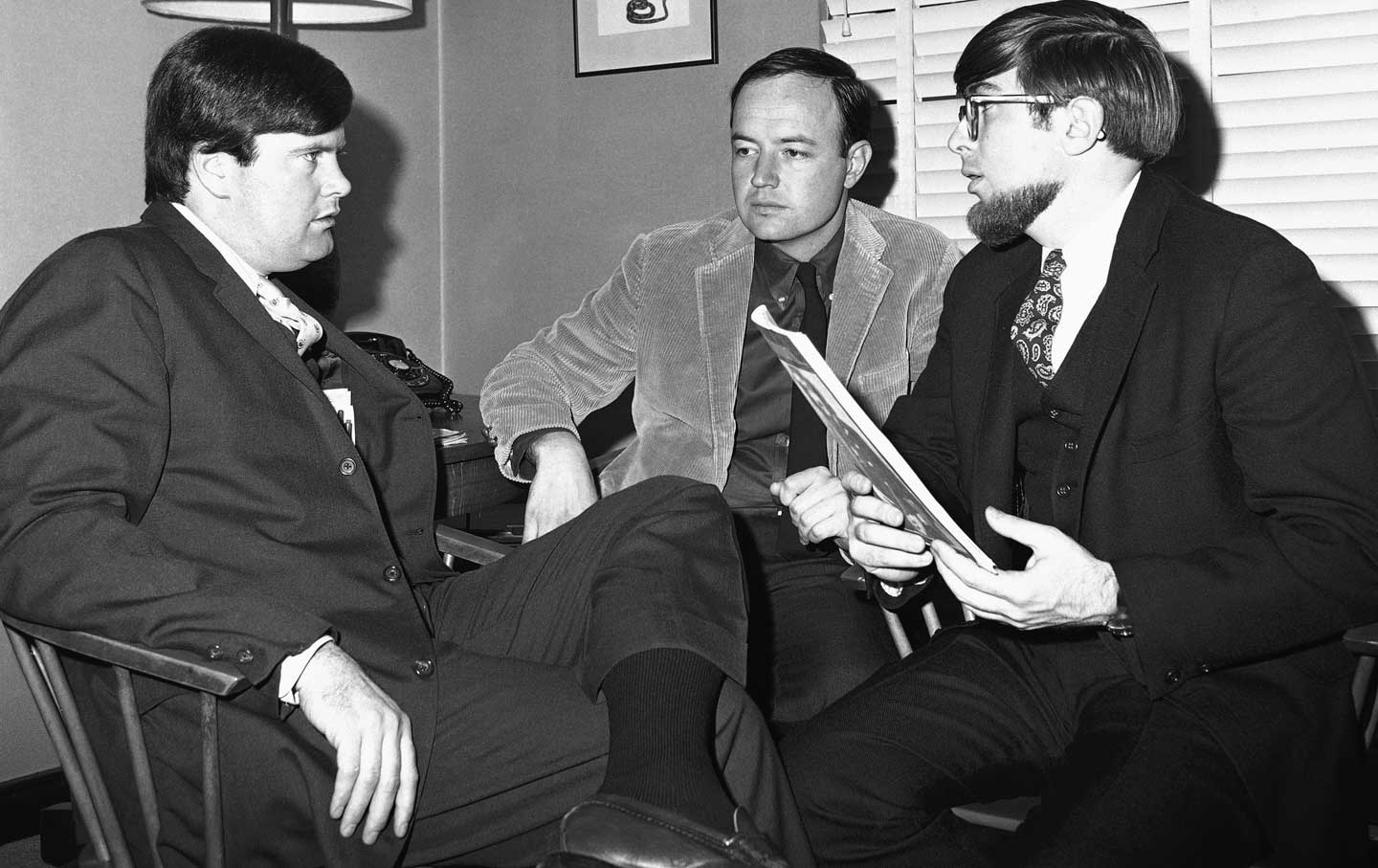by PETER COLLIER
 Ramparts magazine editors and staffers at conference in their San Francisco headquarters February 1967, from Left to Right are: Editor Warren Hinckle III, Assistant Managing Editor Sol Stern, and writer Robert Scheer PHOTO/AP Photo/RHH/The Nation
Ramparts magazine editors and staffers at conference in their San Francisco headquarters February 1967, from Left to Right are: Editor Warren Hinckle III, Assistant Managing Editor Sol Stern, and writer Robert Scheer PHOTO/AP Photo/RHH/The Nation
On the career and style of Warren Hinckle
When I once complained to him about an unflattering mention I’d gotten in a New Yorker article about Allen Ginsberg, Warren Hinckle shot me a derisive look and said out of the corner of his mouth in his distinctive gravelly voice, “Listen, Collier, the only bad press you ever get is your obituary.” This was not just a bon mot but a first principle, so it was ironic that, when Hinckle died in his native San Francisco a few weeks ago at age seventy-seven, his own obituaries were the best press he had gotten in many years, acknowledging his significant achievement midwifing the rebirth of muckraking journalism as the editor of Ramparts magazine in the mid–1960s and giving New Left ideas a raucous four-color presence in the political culture that calamitous era created.
When I joined Ramparts in 1966, Hinckle was already well on his way at age twenty-seven to becoming a living legend. While most of the staff came to work in street-fighter chic, he had his own homemade version of bella figura, showing up most days in a tie and three-piece suit, although sometimes changing pace with patent leather dancing pumps and a maroon velvet jacket. Jowly and plump and conveying an impression of fluid retention, he was an imperious alcoholic and only those who didn’t realize how Irish he was regarded it as paradoxical that he should become more fluent and inventive the more he drank, and that he never—even after several hours at Cookie Pacetti’s, the working-class watering hole where he went to escape intellectuals and politicos—appeared drunk.
When I once complained to him about an unflattering mention I’d gotten in a New Yorker article about Allen Ginsberg, Warren Hinckle shot me a derisive look and said out of the corner of his mouth in his distinctive gravelly voice, “Listen, Collier, the only bad press you ever get is your obituary.” This was not just a bon mot but a first principle, so it was ironic that, when Hinckle died in his native San Francisco a few weeks ago at age seventy-seven, his own obituaries were the best press he had gotten in many years, acknowledging his significant achievement midwifing the rebirth of muckraking journalism as the editor of Ramparts magazine in the mid–1960s and giving New Left ideas a raucous four-color presence in the political culture that calamitous era created.
When I joined Ramparts in 1966, Hinckle was already well on his way at age twenty-seven to becoming a living legend. While most of the staff came to work in street-fighter chic, he had his own homemade version of bella figura, showing up most days in a tie and three-piece suit, although sometimes changing pace with patent leather dancing pumps and a maroon velvet jacket. Jowly and plump and conveying an impression of fluid retention, he was an imperious alcoholic and only those who didn’t realize how Irish he was regarded it as paradoxical that he should become more fluent and inventive the more he drank, and that he never—even after several hours at Cookie Pacetti’s, the working-class watering hole where he went to escape intellectuals and politicos—appeared drunk.
The New Criterion for more